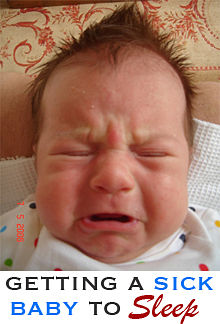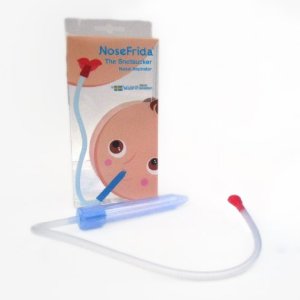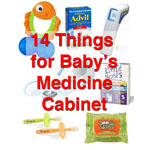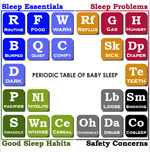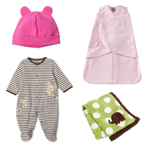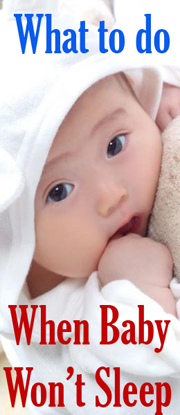 Babies are supposed to be sleeping most of the time (14 to 18 hours a day, according to baby sleep charts). So when your baby won’t sleep, it gets pretty frustrating. Sleep deprivation can be harmful both to babies and their parents, especially when it’s a long-term problem. Hopefully you’re not here because your newborn of 0-2 months won’t sleep longer than 2-4 hours at a time, because that’s perfectly normal.
Babies are supposed to be sleeping most of the time (14 to 18 hours a day, according to baby sleep charts). So when your baby won’t sleep, it gets pretty frustrating. Sleep deprivation can be harmful both to babies and their parents, especially when it’s a long-term problem. Hopefully you’re not here because your newborn of 0-2 months won’t sleep longer than 2-4 hours at a time, because that’s perfectly normal.
However, if your baby is 3 months or older and you’re still having some sleeping problems, this article might help you.
Contents:
How Much Should Your Baby Sleep?
Problem: Baby Won’t Sleep Long Enough
Problem: Baby Won’t Fall Asleep
Problem: Baby Won’t Sleep in the Crib
How Much Should Your Baby Sleep?
The hours you might expect your baby to sleep depends largely on his or her age. Newborns (0-3 months) typically eat, sleep, and poop in 2-4 hour cycles around the clock. Not much you can do about that. Starting at 3-4 months, your baby might turn a corner and start sleeping longer (hopefully at night, but the morning nap after breakfast is common too), say 5-7 hours. At this point, you know your baby is capable of sleeping for long periods, and your goal should be to line that up with your own nighttime sleep schedule as much as possible!
At around 6 months of age, usually when your pediatrician encourages you to start feeding the baby solid food, you might see another change, as many babies start sleeping through the night. It might not happen at 6 months; it could just as easily be 12 months until the stars align to make this happen. Be patient, and keep working at it.
See our baby sleep chart for a detailed breakdown of average daily sleep, number of naps, and longest sleep stretch by adjusted age.
Problem: Baby Won’t Sleep Long Enough
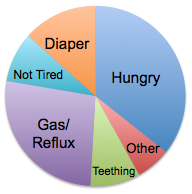 The thing about babies is that they’re completely unaware of “expected” sleeping hours and sleep charts and the need for mom and dad to actually get REM sleep. If your baby won’t sleep for long stretches (especially at night), you are not alone! Most parents go through this with at least one child. First, reassure yourself that, eventually, your baby is going to sleep through the night. It may not be tonight or even a week from now, but it WILL happen. This is human nature. Second, let’s go through some of the more common reasons that a baby won’t sleep, and see if there’s anything that applies to your little one.
The thing about babies is that they’re completely unaware of “expected” sleeping hours and sleep charts and the need for mom and dad to actually get REM sleep. If your baby won’t sleep for long stretches (especially at night), you are not alone! Most parents go through this with at least one child. First, reassure yourself that, eventually, your baby is going to sleep through the night. It may not be tonight or even a week from now, but it WILL happen. This is human nature. Second, let’s go through some of the more common reasons that a baby won’t sleep, and see if there’s anything that applies to your little one.
Cause #1: The baby is hungry
Hunger is, in my experience, one of the most common reasons that a baby won’t sleep for long periods. In support of this notion is the observation that breastfed babies tend to have shorter sleep cycles than formula-fed babies, simply because breast milk (being completely natural) is digested more easily. When your baby wakes up crying, does he or she root around for a nipple? If you offer a pacifier, is it slurped at hungrily and then spit out in utter disappointment? If so, hunger is a likely culprit.
Of course, you’re probably not a moron. Of course you fed the baby before bed. However, a lot of times parents just don’t realize how much babies are capable of eating as they grow and get older. What filled the little one’s tummy last month probably isn’t enough any longer. Making sure that your baby’s appetite is fully sated right before bed is a key step in extending those sleep hours. See our article on nighttime feeding and sleep for more help in this area.
Cause #2: The baby has gas or digestive issues
Many babies, especially at the newborn stage, don’t have a fully developed digestive system yet. This can cause delayed stomach discomfort that wakes your baby up in the middle of an otherwise happy sleep cycle. Also, since their diet for the first 6 months is completely liquid, it’s very easy for babies to get bubbles in the tummy. Unless you do a great job burping the baby, those can come back to bite you in the middle of the night.
One way to determine if gassiness or digestive discomfort are to blame is to watch how your baby acts and cries when he/she wakes up. Squirming, grimacing in pain are positive indicators. A baby that simply lays still and cries might just be hungry. Even if you’re not certain, working to minimize gassiness overnight is always a good strategy for baby sleep training. See our article on 5 things to do when gas keeps baby awake.
Cause #3: When baby is teething
Teething is one of the most troublesome events you’ll ever encounter. Usually the process begins when the baby is 3-4 months old and continues until all the teeth have come in. This one is frustrating because there’s just no way to see it coming. You’ll just suddenly notice an exceptionally fussy baby who:
- Can’t fall asleep, or doesn’t stay asleep for long.
- Wakes up screaming, as if in pain
- Spits out the pacifier
- Seems hungry, but refuses to drink from a bottle
Check for this by washing your hands thoroughly, and then running a finger, with great care, along your baby’s gums. Often you can see where a place is red and/or swollen. If you run a finger over it, you’ll feel the roughness of the tooth breaching the gums.
Once you confirm that teething is the reason your baby won’t go to sleep, apply a teething pain ointment (mild antisthetic like Baby Orajel) to that part of the gums. Baby Tylenol may help as well. The torment will end when the tooth breaches and comes in. For more help, see our article on what to do when baby is teething.
Cause #4: Something External Woke the Baby Up
Babies, just like adults, wake up in response to things in their environment. It’s a survival instinct, but often when your baby is safe and sound, it’s just something that causes unnecessary wake-ups. There are lots of external things that can have this effect, including:
- Temperature changes. If the baby gets too hot or too cold, they might easily wake up. Do your best to keep a steady temperature in the room, and consider swaddling your baby or using a baby sleep sack to keep them warm enough.
- Wet or dirty diaper. Some babies can sleep through this, but most won’t. That’s why you change the diaper right before bed and maybe use the super-absorbent nighttime ones. We have a whole article about the importance of diapers for sleeping.
- Loud noises. The world outside your baby’s nursery can be quite inconsiderate when it comes to baby’s sleep time. We’ve had issues with garbage trucks, leafblowers, noisy neighbors, and even older siblings waking our little ones up. Unfortunately, most of us can’t control everything that could make a noise, so the best defense is a crib soother or sound machine or even just a fan. The idea is to provide some white noise that drowns out random sounds.
- Sunlight. A lot of people are early-morning risers who are up by sunrise. I am not one of them. For me, a baby waking up at dawn is not a good thing. If you notice your little one’s wake-ups coincide with when it starts to get light out, the sun might be to blame. Block out that light as much as possible with room-darkening window shades and heavy curtains. Even a tiny crack can let a beam of sunlight in to shine right on the baby’s face. We use tape, books, pillows, or whatever’s necessary to make every window totally sunproof.
For a more in-depth look at this, you might enjoy our article 7 reasons your baby woke up last night.
Problem: Baby Won’t Fall Asleep
Another issue many parents encounter is the baby that refuses to fall asleep, even when it’s bedtime and mommy and daddy are completely worn out. If you have this problem, the solution is less about finding a “cause” and more about establishing good, regular habits for you and your baby. This is what baby sleep training is all about: finding a routine that works because it meets all of your baby’s needs and prepares them, mentally and physically, for falling asleep. Here are three questions to ask yourself:
- Did you get your baby ready for sleep? This means you’ve fed and burped the baby, changed the diaper, put on soft comfy pajamas, done the swaddle or sleep sack, and maybe even did some rocking and/or a lullaby. All of these are the sensory cues that your baby’s about to go to bed for the big sleep.
- Is it time for the baby to go to sleep? If the baby just got up an hour ago, he or she won’t be ready for bed. Many parents find a sort of rhythm with their babies, a cycle of eating, play time, diaper changes, and sleeping so that everything is spaced out nicely. Some of my readers object to the idea of a “schedule” for a baby. However, if you’ve ever visited (or been in) the NICU, you’ll see a very organized one: each baby under a nurse’s care eats, gets changed, and sleeps by the clock. You don’t have to be this draconian, but keeping to a somewhat regular daily routine will help.
- Have you established and followed a good bedtime routine? This is a process that you go through every night with the baby, both to get them ready for bed (as in item #1) and to make the process a habitual one with no surprises. The bath-bottle-bed routine is a classic example. The warm wetness of the bath, brief chill of getting out, followed by warm clothes and a bottle of milk has been putting babies to sleep for decades. See our guide to establishing a baby bedtime routine for some pointers.
For more help with this problem, see our list of 12 ways to help a baby go to sleep.
Problem: Baby Won’t Sleep in the Crib
This is a special problem, one for which (unfortunately) the parents get most of the blame. It’s very easy to get into the habit of letting your baby fall asleep where he or she does it best: the swing, the couch, the parents’ bed, or in mommy’s arms. And it tends to be fricking adorable when your baby does konk out in these places. However, getting your baby to sleep in the crib is a critical, critical step for you to establish healthy sleep habits. It also happens to be the safest place for baby to sleep at night.
Ideally, you started putting baby in the crib to sleep from the day he or she got home from the hospital. That’s the easiest way because they’re so little that their bodies just need sleep and they can’t fight it. The longer you wait, the harder it gets to make a transition. If you need help, see our article on getting baby to sleep in the crib.
